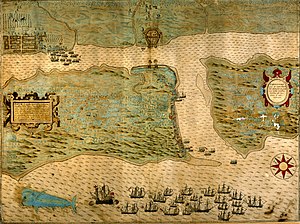Raid on St. Augustine
| Raid on St. Augustine | |||||||
|---|---|---|---|---|---|---|---|
| Part of the Anglo–Spanish War | |||||||
 Sir Francis Drake in St. Augustine 1586 hand-colored engraving, by Baptista Boazio, 1589 |
|||||||
|
|||||||
| Belligerents | |||||||
|
|
|
||||||
| Commanders and leaders | |||||||
| Governor Pedro Menéndez de Márquez |
Francis Drake Christopher Carleill |
||||||
| Strength | |||||||
| 100 soldiers & militia Unknown number of Indians 2 forts |
23 ships, 19 support vessels & prizes, 1,000 troops |
||||||
| Casualties and losses | |||||||
| 35 killed or wounded | Light | ||||||
![]() Spain
Spain
The Raid on St. Augustine was a military event during the Anglo-Spanish War in which the Spanish settlement of St. Augustine was captured in a small fight and burnt by an English expedition fleet led by Francis Drake. This was part of Francis Drake's Great Expedition and was the last engagement on the Spanish main before Drake headed north for the Roanoke Colony. The expedition also forced the Spanish to abandon any settlements and forts in present-day South Carolina.
War had already been unofficially declared by Philip II of Spain after the Treaty of Nonsuch in which Elizabeth I had offered her support to the rebellious Protestant Dutch rebels. The Queen through Francis Walsingham ordered Sir Francis Drake to lead an expedition to attack the Spanish New World in a kind of preemptive strike. Sailing from Plymouth, England, he struck first at Santiago in November 1585 then across the Atlantic at the Spanish new world city of Santo Domingo of which was captured and ransomed on 1 January 1586 and following that successfully attacked the important city of Cartagena on 19 February.
...
Wikipedia
